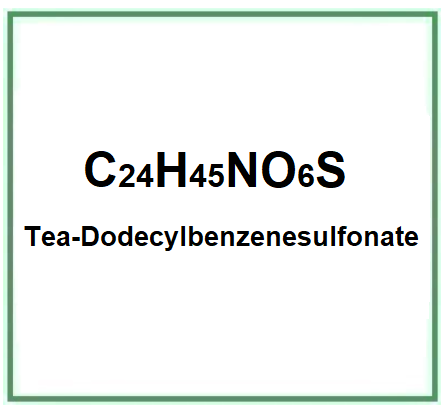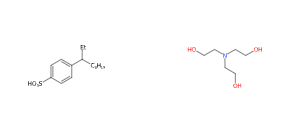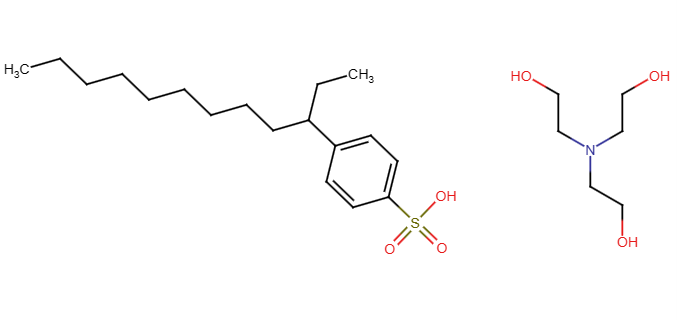Tea-Dodecylbenzenesulfonate is a chemical compound formed by combining triethanolamine with dodecylbenzenesulfonic acid.
The name describes the structure of the molecule:
- "Tea" indicates "Triethanolamine", a base used to neutralize acids and form salts.
- "Dodecylbenzenesulfonate" indicates a salt or ester of dodecylbenzenesulfonic acid, an anionic surfactant.
Description of the raw materials used in production and their functions:
- Dodecylbenzenesulfonic acid. A sulfonic acid derived from dodecylbenzene. It provides the anionic part of the surfactant.
- Triethanolamine (TEA). A molecule containing three -OH groups. Used to neutralize the acidity of dodecylbenzenesulfonic acid and form the salt.
Step-by-step industrial synthesis:
- Dodecylbenzenesulfonic acid is fed into a reactor.
- Triethanolamine is added to the dodecylbenzenesulfonic acid in proportion.
- Under stirring and controlled conditions, the two raw materials react to form the TEA-Dodecylbenzenesulfonate salt.
- After the reaction, the product can be purified, if necessary, to remove any impurities.
- The final product is then conditioned and ready for use or sale.
TEA-Dodecylbenzenesulfonate typically appears as a yellowish to amber liquid.

Cosmetic Safety
It is a restricted ingredient as III/62 a Relevant Item in the Annexes of the European Cosmetics Regulation 1223/2009. Substance or ingredient reported: Trialkylamines, trialkanolamines and their salts. "Do not use with nitrosating systems - Minimum purity: 99% - Maximum secondary amine content: 0.5% (applies to raw materials) - Maximum nitrosamine content: 50 microgram/kg - Keep in nitrite-free containers"
INCI Functions:
Cleansing agent. Ingredient that cleanses skin without exploiting the surface-active properties that produce a lowering of the surface tension of the stratum corneum.
Foaming. Its function is to introduce gas bubbles into the water for a purely aesthetic factor, which does not affect the cleaning process, but only satisfies the commercial aspect of the detergent by helping to spread the detergent. This helps in the commercial success of a cleansing formulation. Since sebum has an inhibiting action on the bubble, more foam is produced in the second shampoo. In practice, it creates many small bubbles of air or other gases within a small volume of liquid, changing the surface tension of the liquid.
Surfactant - Cleansing agent. Cosmetic products used to cleanse the skin utilise the surface-active action that produces a lowering of the surface tension of the stratum corneum, facilitating the removal of dirt and impurities.
- Molecular Formula C24H45NO6S
- Molecular Weight 475.7 g/mol
- CAS 27323-41-7
- UNII 8HM7ZD48HN
- EC Number 248-406-9
- CHEMBL3187595
Synonyms:
Dodecylbenzene sulfonate triethanolamine(1:1)
![]() Tea-Dodecylbenzenesulfonate
Tea-Dodecylbenzenesulfonate 




